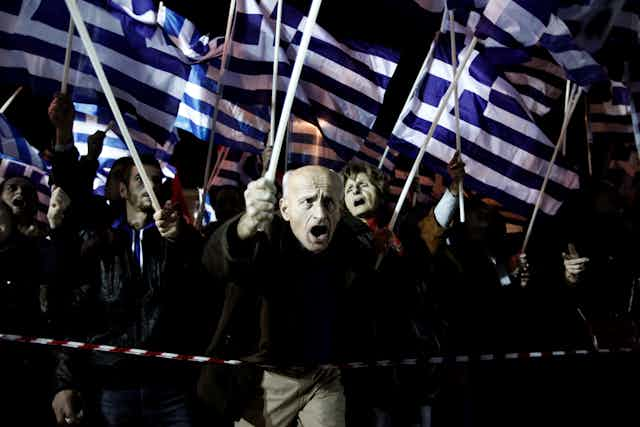Around the world it seems far-right groups can infiltrate the mainstream regardless of a given country’s political present or past. The question is, then, how do they do it?
The far-right movement Golden Dawn, based in Greece, is a prime example of how fringe groups can become major political forces. Since it first emerged in the early nineties, the group has adapted to change, seized political opportunities, and diversified and expanded its base. Golden Dawn first came to public attention in 1992, as Greeks were demonstrating in their thousands against a proposal to give the name Macedonia to the neighbouring former Yugoslav Republic. Golden Dawn’s hardline position was that Macedonia belongs to the cultural heritage of modern Greece, and that naming an independent nation after it would provoke territorial claims against Greek territories.
Throughout the 1990s, Golden Dawn began deradicalising its discourse in order to run for election. But the deep financial crisis that shook the foundations of the nation in the late 2000s provided the group with new opportunities. Greece entered a spiral of high fiscal deficits, recession, unemployment, bail-out loans and austerity. The consequences were unevenly distributed between classes. Resentment rose, and economic issues spilt over into the political realm. A major realignment of the party system followed.
Greece’s main populist far-right party Popular Orthodox Rally (LAOS) was formed in 2000 by George Karatzaferis, a former member of Greece’s major centre-right party New Democracy. As the crisis unfolded, LAOS began to emerge as a political force on a nationalist, xenophobic platform. The party associated immigration with Greece’s domestic problems and found its winning formula. By 2007, it had entered parliament and by 2011 it was part of an interim three-party coalition government.
Whilst Golden Dawn’s position remained the most nationalist, anti-immigrant and coherent throughout the crisis, LAOS’s successes worked to Golden Dawn’s advantage. Golden Dawn’s toned-down rhetoric brought it directly into the programmatic territory of this main competitor and various links were forged between the two. For instance, two Golden Dawn members were listed as LAOS representatives in the 2002 local elections, giving Golden Dawn an experience in institutionalised politics. As the crisis developed and LAOS set about introducing its anti-immigration agenda at the government level, it helped legitimise Golden Dawn’s xenophobic discourse.

This process continued as centre-right party New Democracy under Antonis Samaras gradually started to absorb LAOS’ anti-immigration agenda. LAOS itself was weakened as a result of its stint in coalition government. Many of its supporters had voted for its anti-establishment agenda and were turned off by its participation in establishment parties’ economic policies. This opened up new opportunities for Golden Dawn.
Winning the ground war
Learning from other social movements, Golden Dawn set up a football hooligan team, the Azure Army, and a youth branch, Counterattack. These side projects have enabled Golden Dawn to keep its most radical followers happy while attracting new members from among radical youth groups. The Azure Army incited the first pogrom against foreigners in modern Greek history in Athens, after Greece won the UEFA Euro 2004.
But Golden Dawn’s most powerful play was securing a local stronghold in Athens by taking control of a city-centre neighborhood with one of the highest non-Greek populations. This was achieved through pogroms and individual violent attacks but also door-to-door canvassing. It also engaged in grassroots activism. Golden Dawn set up “people’s committees”, which complained in the media about immigrant criminality. It distributed a journal called “The Voice of the Residents of Agios Panteleimonas”.
Later on, Golden Dawn enriched its repertoire with a series of “social policies”. It started distributing food to natives in need (after ID control), clothes and toys to orphans, and even started a blood donation campaign “only for Greeks”.
By 2012 it had consolidated its position in the Greek parliament. By 2015 it had become the third opposition party. Even as it takes its place in the mainstream, it remains one of the most extreme formations in Europe. It is inspired by National Socialist ideological and organisational principles and opposes democracy, communism and liberalism.
In 2016, Golden Dawn proposed strict legislation to crack down on “illegal migration”. Since 2015, many of the party’s high and low-ranking members have been on trial for a series of offences, including manslaughter and gun possession. But, rather than denting Golden Dawn’s popularity, the party has been active in confronting the PR surrounding these trials. It has used its own alternative media channels – a newspaper, radio station and online TV station – to distribute its own alternative information.
The trials provide Golden Dawn with the perfect opportunity to present itself as victim of state repression – an image that has long resonated with its anti-establishment base.
By adapting its narrative, developing mobilisation strategies and striking political alliances with right-wing parties already in the mainstream, Golden Dawn made its way to a position of great influence in Greece. Its story shows how important adaptability is to fringe groups. It helps them to become sustainable, even when threatened. By adapting, far-right fringe groups can advance within a democratic system, like left-wing movements do.

